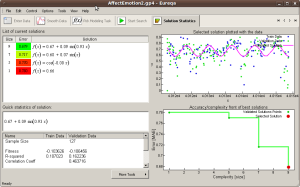The formula for happiness turns out to be 0.67 + 0.09 * sin(0.93t), who would have thought it was so simple?
At least that is what you get if you put my personal mood data from Affect Sampler through the free-as-in-beer download of Eureqa. This is a workbench that applies the techniques from Hod Lipson’s “Distilling Free-Form Natural Laws from Experimental Data” paper, using genetic programming to find parsimonious functional forms for arbitrary data.
I was really impressed with how quick and easy it was to set up and find something reasonable. While the fit is far from great on my toy emotion tracking test, with just a few weeks’ data (surprisingly, my moods are not exactly periodic!) it does seem to have found a something approaching a valid pattern. With t measured in days, 2*PI/0.93 = 6.75 which is close to seven. It looks to me like it is trying to fit a weekly rhythm, which seems plausible enough.
What do you think?

